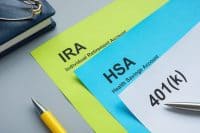Personal Finance
Should I prioritize my 401(k) employer match over maxing out my HSA contributions?

Published:

A Reddit user discussed whether to contribute to a 401(k) or HSA.
You should contribute enough to a 401(k) to earn your full employer match.
After earning your matching contributions, maxing out an HSA is usually your next best move.
The best high yield savings accounts are paying way more than most Americans realize, with some are offering cash bonuses for new accounts. Click here to see our top pick today. (Sponsored)
Balancing competing financial priorities is always a challenge, but a Reddit poster recently made a suggestion to help you figure out where your funds should go.
The Redditor said that the top priority is contributing enough money to your 401(k) to earn your full employer match. Once that has been accomplished, the poster said the next priority should be maxing out HSA contributions.
So, is the Reddit poster right? Is this the right way to optimize your money and end up richer?
The Redditor is absolutely correct that putting money into a 401(k) to earn an employer match should be the first thing you do with your funds — even ahead of contributing to an HSA. The reason that earning a 401(k) match should be your primary goal is simple: When your employer matches contributions, this is free money.
401(k) matches are structured in different ways. In most cases, an employer provides a full or partial match on contributions that you make, up to a set percentage of your salary. For example, you might get a 50% match on up to 6% of your salary or even a 100% match on up to 4% of your salary. If you earned $100,000, this would mean your employer would match 50% of contributions up to $6,000 or 100% of contributions up to $4,000.
Depending on how your match works, your employer’s contributions provide an immediate 50% or 100% return on investment on every dollar that you put into your account, up to the maximum limit. This is guaranteed, risk-free. There are no other investments where you can get an immediate 50% or 100% risk-free return. Plus, you get to put money in pre-tax, so your return is actually a little better than it appears on the surface. And, you also benefit from tax-free growth on the money you contributed, as you don’t pay taxes on any money in your 401(k) until you begin to make withdrawals in retirement.
Passing up the match would mean giving up these generous returns for no reason, and losing out on the chance to invest to earn even more returns and build a secure retirement. The match, combined with the tax savings a 401(k) offers, gives you the chance to invest a relatively small sum for a big payout. If you invested $4,000 to earn your full 100% match, the contribution could save you up $880 on your taxes if you were in the 22% tax bracket. Your contribution would effectively cost you $3,120 but you’d end up with $8,000 in your account. That’s a great ROI and you should not miss the chance to boost your net worth by so much.

When you invest in an HSA, you make contributions with pre-tax dollars, enjoy tax-free growth, and get tax-free withdrawals. Your 401(k) doesn’t offer all three of these benefits, since withdrawals are taxed. In fact, an HSA is the only account with the triple tax break.
Now, your withdrawals are tax-free only if the money is used for qualifying health expenses, but since medical care is a big expense in retirement, chances are good you’ll be able to withdraw most of the money to cover care costs and avoid taxes in the process.
Even if you can’t do that, HSA withdrawals for non-medical purposes are penalty-free and just taxed at your ordinary income tax rate if the withdrawal is made after age 65. So, the worst-case scenario is the HSA contributions will be taxed just like 401(k) contributions, but the best-case scenario is that you’ll be able to get those tax-free withdrawals. Scoring extra tax savings is a good reason to switch to HSA contributions if you have earned your match, and are eligible to make them.
While a financial advisor can help you to determine your personalized approach to prioritizing your account contributions, maxing out a 401(k) match and then an HSA is usually going to turn out to be the best option. You should seriously consider aiming to accomplish these goals in 2025 and beyond.
The last few years made people forget how much banks and CD’s can pay. Meanwhile, interest rates have spiked and many can afford to pay you much more, but most are keeping yields low and hoping you won’t notice.
But there is good news. To win qualified customers, some accounts are paying almost 10x the national average! That’s an incredible way to keep your money safe and earn more at the same time. Our top pick for high yield savings accounts includes other benefits as well. You can earn up to 3.80% with a Checking & Savings Account today Sign up and get up to $300 with direct deposit. No account fees. FDIC Insured.
Click here to see how much more you could be earning on your savings today. It takes just a few minutes to open an account to make your money work for you.
Thank you for reading! Have some feedback for us?
Contact the 24/7 Wall St. editorial team.